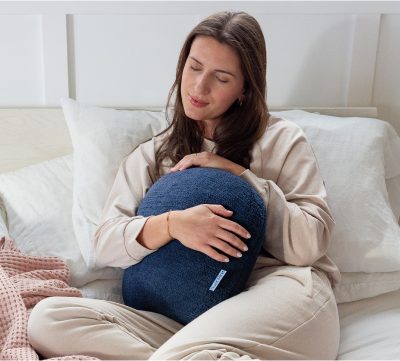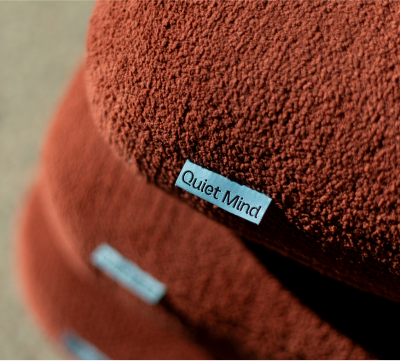Stress doesn’t always show up as chaos. Sometimes it’s the quiet heaviness behind your eyes. The tight breath at bedtime. The sense that no matter how much you do, something still feels undone.
If you’re carrying more than you can name—juggling work, care, and the invisible weight of mental to-do lists—you’re not alone. Stress is a natural part of life, but when it lingers, it can quietly wear down your body, your focus, and your sense of self.
This guide offers five gentle, evidence-informed ways to reduce stress that don’t require perfection or extra time—just small returns to presence, softness, and stability.
Understanding Stress: Why It Affects Us All
Stress arises when the demands of life feel larger than your capacity to meet them. The body, sensing urgency, reacts—releasing hormones like cortisol and adrenaline to prepare for action. Helpful in short bursts. Harmful over time.
When stress becomes chronic, it affects more than your mood. It shifts your sleep, your appetite, your focus, your sense of safety.
But stress is not the enemy. It's a signal. A message that something needs your attention.
And while you may not be able to avoid every stressor, there are gentle, effective ways to manage stress and support your mental and physical health along the way.
Here are five that many people find especially grounding.
1. Movement and Exercise: Easing Tension Through the Body
Physical activity is one of the most effective ways to relieve stress because it gives your nervous system a safe outlet. The act of moving tells your brain: you’re safe now. It resets your stress response, helping you recover from both acute stressors and chronic stress.
Why Exercise Helps You Manage Stress
When you move, your body releases endorphins—feel-good chemicals that naturally boost mood and reduce pain. At the same time, movement lowers cortisol and adrenaline levels, helping your body shift out of the fight-or-flight mode. This process may also help lower blood pressure and heart rate, reducing the long-term effects stress can have on your health.
Exercise also improves sleep quality, enhances focus, and helps your body regulate its own rhythms—essential for anyone navigating day-to-day life stressors.
Gentle, Naturally Stress-Relieving Activities
You don’t need to train for a marathon to access these benefits. In fact, some of the most effective forms of exercise are low-impact and intentionally calming:
- Walking outdoors: A simple walk in nature combines aerobic activity with sensory regulation. It’s an easy, healthy way to get your body moving while giving your mind space to breathe. In fact, a study found that a 90-minute walk in a natural setting can lower activity in the part of the brain linked to rumination and depression.
- Yoga or stretching: These practices are excellent for reconnecting the body and mind, softening physical tension, and increasing emotional well-being.
- Tai Chi or slow mobility work: These meditative movements help lower stress levels by activating your parasympathetic nervous system—the body’s “rest and digest” mode.
- Strength training in moderation: Lifting weights, when done gently, can be grounding. It builds not just muscle, but also resilience.
Making Movement a Daily Ritual
If stress has been keeping you stuck, start with just 10 minutes. Add movement to your to-do list like any other important task. You might take a walk during lunch, stretch before bed, or do a few yoga poses between meetings. Choose what feels doable—not what feels forced.
2. Mindfulness and Meditation: Creating Mental Space
The mind can be a noisy place, especially during stressful periods. Worry loops, negative self-talk, and mental clutter can make it hard to concentrate, sleep, or even connect with others. This is where mindfulness-based strategies and breathing exercises become powerful tools to manage stress and reclaim inner calm.
Why Mindfulness Matters in Stress Management
Stress is a natural response when your brain perceives a threat or overload. But when that response becomes constant—whether due to work, family, or internal pressure—it can impair both physical and emotional functioning. Over time, it may contribute to anxiety and depression, raise blood pressure and heart rate, and disrupt the balance between your body and mind.
Mindfulness doesn’t remove the stressor—but it does change your relationship to it. By grounding you in the present moment, mindfulness can reduce your stress, ease reactivity, and enhance your capacity to cope.
Gentle Ways to Practice Mindfulness
These practices don’t require silence or perfection. Just presence.
- Deep breathing: Try a 4–4–6 pattern—inhale for 4 seconds, hold for 4, exhale for 6. This helps activate your parasympathetic system, calming adrenaline and lowering cortisol levels.
- Guided meditation: Use a recording or app that supports your focus. Just 5–10 minutes a day can retrain your brain to pause before reacting.
- Body scans: Gently observe sensations, starting from your feet and moving upward. This helps restore awareness and regulate physiological responses to stress.
- Try journaling: Writing about your thoughts and feelings can help relieve stress, clarify emotions, and support emotional well-being.
These practices can help you stop stressing and overthinking by redirecting your attention and softening mental loops that keep your system on edge.
Building Mindfulness Into Your Routine
- Begin or end your day with just 2–3 minutes of stillness.
- Anchor mindful pauses to daily habits—like brewing tea or brushing your teeth.
- Be kind to yourself if your mind wanders (because it will.)
Mindfulness improves not only mental and physical health, but also work-life balance and relationship satisfaction. It’s a gentle yet profound way to deal with stress—starting with your breath, your awareness, and your pace.
3. The Power of Connection: Social Support and Belonging
When you talk to someone you trust, your body often responds before your mind does: your breathing slows, your shoulders drop, your heart rate steadies. This is the power of co-regulation—one of the most natural ways to reduce your stress and bring your system back into balance.
Why Social Connection Helps Manage Stress
Studies from the American Psychological Association show that people with strong support systems tend to have lower stress levels, healthier immune responses, and better outcomes with both physical and mental health conditions. In fact, stress and anxiety often feel less overwhelming when you feel seen, heard, and supported.
Social interaction may also help lower blood pressure, regulate cortisol, and reduce the risk of chronic stress turning into burnout or illness. When life becomes stressful at times—whether at work or at home—relationships provide safety, perspective, and care.
Ways to Connect and Cope Together
Even small acts of connection can help you feel better and cope with stress more easily:
- Talk to a family member or friend who listens without judgment.
- Join a group or class that shares your interests or values.
- Volunteer your time—helping others can shift your stress focus and boost your mood.
- Reach out to someone you know is struggling—connection is healing in both directions.
When you're not sure where to start, send a simple message. You don’t need a perfect script. Just begin.
When Connection Feels Hard
If isolation or emotional fatigue has made it hard to reach out, start with gentleness:
- Share how you’re really feeling with one person
- Choose spaces where you feel psychologically safe
- Seek professional support if social stress is part of your story
You’re not meant to deal with stress alone. Relationships are a healthy way to release tension and rewire your stress response. Even a single moment of shared presence can help you recharge, reconnect, and feel more capable of navigating day-to-day life.
4. Sleep and Stress: Restoring the Nervous System
Rest is not a reward—it’s a biological necessity. Without consistent sleep, your body can’t properly recover from the wear and tear of daily life. And when stress becomes chronic, it disrupts the very systems that allow you to restore balance.
How Stress Affects Your Sleep
Elevated cortisol and adrenaline levels—part of your natural stress response—can delay the onset of sleep, cause frequent waking, or prevent deep rest altogether. Over time, lack of sleep doesn’t just make you tired. It affects your mental and physical health, impairs memory, disrupts mood, and worsens your ability to cope with stress.
Poor sleep may also contribute to anxiety and depression, and has been linked to more serious health conditions such as high blood pressure and heart rate irregularities.
This is why prioritizing rest is one of the most effective ways to reduce your stress and improve your overall quality of life.
Tips to Improve Your Sleep Routine
Creating a calming bedtime ritual can help signal to your body and mind that it’s safe to wind down. Consider the following healthy ways to support better sleep:
- Get enough sleep by aiming for 7–9 hours each night.
- Wind down at least 30 minutes before bedtime with deep breathing, reading, or soft music.
- Avoid screens and caffeine in the evening.
- Use supportive cues like low lighting, herbal tea, or a warm bath.
- Try breathing exercises to calm the nervous system and prepare for sleep.
A consistent sleep routine may also help lower cortisol levels and support both physical and emotional recovery, especially during stressful periods.
Supporting the Nervous System with Rest
Sleep is where healing happens. It’s where stress affects your body the least and recovery begins. Adequate rest strengthens your physiological resilience and helps the prefrontal cortex (the part of the brain responsible for decision-making and focus) function more effectively.
If falling asleep feels difficult, remind yourself: this is not about perfection—it’s about rhythm. Your body responds to consistency and safety, not pressure.
Supporting rest is one of the kindest ways to manage stress, support your emotional well-being, and care for your overall health. If you’re feeling burned out, it may be time to learn how to reset your body from chronic stress—gently, gradually, and with routines that nourish your whole system.
5. Relaxation and Joy: Activities That Calm the Mind
They’re essential nutrients for the body and mind, especially during prolonged periods of stress and anxiety. When you intentionally engage in experiences that feel comforting, creative, or playful, you activate the part of the nervous system that promotes healing and calm.
These practices do more than make you feel good in the moment—joy and positive experiences support your long-term ability to cope with stress and protect your mental and physical health.
Why Joy Matters for Stress Relief
Stress can make life feel heavy, rushed, and restrictive. But joy expands your inner world. It reminds you that despite what’s hard, there are still healthy ways to feel present, connected, and alive.
Engaging in naturally stress-relieving activities may help lower blood pressure, reduce muscle tension, and increase positive emotions. In fact, joy has a physiological impact—it helps shift your body out of high alert and relax your mind from stress.
Gentle Practices to Help You Relax and Recharge
These stress relievers aren’t meant to fix everything. Instead, they serve as reminders that safety and softness can exist—even in small moments. Consider:
- Creative outlets like drawing, painting, or music.
- Sensory rituals such as aromatherapy, warm baths, or mindful tea preparation.
- Mindfulness-based relaxation like nature walks or gardening.
- Try journaling to process emotions or spark inspiration.
- Reading or puzzles to redirect focus and encourage presence.
- Gentle tools like weighted pillows, which offer calming pressure that some people find soothing during moments of rest, reflection, or emotional overwhelm.
You don’t need to be “good” at any of these. The point is to find what helps you feel better, calms your system, and creates space for peace to re-enter your day-to-day life.
Connection and Belonging
Joy is often magnified through connection. Whether it’s sharing a laugh with a family member, texting a friend, or simply sitting in shared silence—social bonding is a powerful way to relieve stress.
If someone you know is struggling, your presence—your calm, quiet support—can make a meaningful difference. You don’t need the perfect words. You just need to show up.
When life feels stressful at times, reconnecting with joy and relaxation isn’t avoidance—it’s a healthy way to restore your overall health and emotional well-being.
Finding Your Own Rhythm in Stress Reduction
Stress may be part of life—but so is recovery. You don’t have to overhaul everything to feel better. Sometimes, it’s the smallest shifts that offer the greatest relief: a deeper breath, a step outside, a quiet moment at the end of a long day.
Each of these five practices is a simple, sustainable way to reduce your stress and reconnect with your body and mind. They don’t require perfection—only presence.
As you begin, remember: your pace is enough. Your needs are valid. And every step you take toward calm is a meaningful one.
Be gentle with yourself. This is how healing begins.
About QuietMind
At QuietMind, we understand that stress can feel all-consuming—but healing doesn’t have to be. Our mission is to offer calm, compassionate support for your nervous system through simple, sensory-based tools and grounded resources.
We create articles, practices, and physical supports that honor your unique pace—whether you're learning to cope with chronic stress, building mindfulness routines, or simply seeking a more peaceful way to move through your day.
One of our most beloved tools is the QuietMind Weighted Pillow—a soft, compact support that may help ease physical tension, quiet anxious thoughts, and offer a sense of safety when the world feels too fast. It’s designed to bring gentle presence to your everyday rituals—whether you’re resting, breathing, or finding your way back to calm.
Frequently Asked Questions
Can stress ever be healthy or helpful?
Yes—in short bursts. It helps you stay alert or meet a deadline. But when it lingers, it begins to erode your well-being.
What if nothing seems to help with my stress?
If self-care tools don’t feel like enough, reaching out to a therapist or counselor can be powerful. You don’t have to carry this alone.
How long does it take to feel better using these strategies?
Relief is personal. Some feel a shift in days; others, in weeks. What matters is consistency and curiosity in the process.
Is it normal to still feel overwhelmed even when I try these?
Absolutely. Healing isn’t linear. Some days will feel heavier. Keep going—gently.
How can I prioritize self-care when I'm feeling overwhelmed?
Start with one small thing. A deep breath. A short walk. A glass of water. Build from there. You don’t need an hour—you need a moment.

















